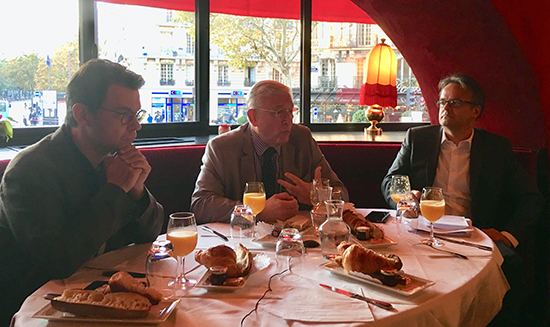Can France’s PACTE Bill Transform Business Priorities?
A year after launching its plan of action for the growth and transformation of French businesses (PACTE), the National Assembly has adopted the bill on first reading. But what responsibilities will businesses now have when it comes to the demands and needs of contemporary society? Will their societal role undergo a complete overhaul after the vote, or will the process be more gradual? These questions were at the heart of a debate between two HEC Paris professors on October 9 2018, just hours after the law was passed by the National Assembly.

Professors Rodolphe Durand and Alain Bloch were swift to point out that the Loi PACTE marks a “historic” moment for France, largely because it calls into question the raison d’être of businesses today. By changing the 1833 article of the Civil code - an article that has hardly evolved over the past two hundred years - this law redefines the role of French businesses in the 21st century. Most notably, it asks that every firm be managed with society’s best interests at heart, by focusing on the environmental and social impacts of its production.
Across 70 articles and 1000-plus pages, the Loi PACTE studies key aspects in the development of small and medium-sized enterprises (SMEs) and their employees. It was set in motion by a consultation that began in January 2018. Some 7,700 people sent close to 13,000 contributions in response to the 31 proposals made by the executive.
The result? “This should bring about fundamental change,” claimed Rodolphe Durand, Professor of Strategy and Academic Director of the Society and Organizations (S&O) Center at HEC, “because the law translates a fundamental change in values. Sociologists, management professors, ecologists, climatologists and environmental specialists can now prove that social and environmental issues are crucial. It is answering these priorities that will determine the survival of our social and political systems. Meanwhile, those who resist or reject the law lose credibility by suggesting that profit is the only motivation in the business world.” Recent examples tend to support Durand’s argument: in an opinion column published on October 17, the President of the College of Directors of Sustainable Development (C3D), Fabrice Bonnifet, argues that “the old model of businesses as indiscriminate predators will disappear as consumers become more aware of their power, to be replaced by a new model, that of businesses as forces for good in society.”
Prioritizing Longevity
Alain Bloch, for his part, underlined the fact that the law ought to encourage companies to prioritize long-term development over profit. “In strategic terms,” the Scientific Director of HEC Entrepreneurs explained, “longevity is an alternative to profit, even if they are not mutually exclusive. It’s a question of hierarchy: if we prioritize longevity, we will be integrating social objectives but, at the same time, redistributing resource allocation.” An entrepreneur himself, Alain Bloch added, “Essentially, the Loi PACTE is a question of short-term versus long-term. It reminds us that short-termism is ultimately disastrous if it amounts to profit being the sole ethos driving an institution. When that is the case, it is our environment and our society that suffer the consequences.”
As for the law itself, Alain Bloch expressed his disappointment at the government’s over-cautious approach. He feels that it has been caught unawares by the growing demand for fundamental change: “The government should have phrased the law differently. Given the success enjoyed by family businesses such as Michelin, the benefits of longevity are plain to see. It brings together all the stakeholders in a company. Why not add the following sentence to the Loi PACTE: 'A business must be run with its long-term benefits in mind'?”
A European Vision
With a view to a rosier future for our society, Rodolphe Durand called for entrepreneurs to take center stage ahead of shareholders. He underlined the European dimension of the debates about “Anglo-Saxon mercantilism” and the development strategies employed by emerging nations: “A number of signs reveal that people in Europe have woken up to the reality of the situation. EU commissions and laws are taking sustainable finance into account for the entire continent. The debates in Brussels have raised the idea of certifying companies according to their social and environmental impact performances. This suggests that these values will be assimilated throughout Europe over the course of the next Parliamentary term. I think that, little by little, Europe is becoming an economic and political zone tuned into contemporary issues.”
“But let’s not get ahead of ourselves! We have also seen some reticence; the electorate’s defensive reaction might benefit the populist political parties in territories that are less inclined to evolve. For me, the European elections on May 26, 2019 will be the most important elections since 1979” (Editor’s note: the first European elections to be decided by the popular vote).
The Loi PACTE and Education
As the morning event drew to a close, Alain Bloch turned to HEC’s gradual acceptance of these new values in its teaching. “They are becoming part of our pedagogical structures and, on that point, I think we must make amends. For too long, we allowed the dogma of profit to dominate all other factors to an irrational degree, without finding fault in our approach or without considering its long-term consequences. But, in my eyes, the majority of professors have now become aware of this new paradigm. These days, even diehard finance professors are encouraging a critical outlook in their students and searching for alternative models.”
Both professors will undoubtedly be monitoring the progress of the Loi PACTE and its examination by the Senate in January. Assuming the law is adopted, the government anticipates that the first measures will be put into place at the beginning of 2019.